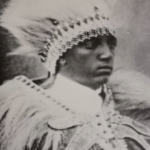MOKONE, MANGENA MAAKE
- 4 Min Read
Rev. Mangena Maake Mokone (1851-1936), opposed racial discrimination and segregation in the churches, sought African religious self-government, and founded the Ethiopian Church in 1892. Mokone later was instrumental in uniting the Ethiopian Church with the African Methodist Episcopal Church in South Africa.
Born in the Transvaal in 1851, Mokone worked on a sugar plantation in Natal. He later moved to the city of Durban where he worked as a labourer during the day, while attending night school. In 1874 he was baptised a Christian. The following year he began theological studies in Pietermaritzburg, Natal. He studied there for five years at the end of which he was appointed to a preaching circuit of the Wesleyan Methodist Church in Natal. In 1882 he was posted to Pretoria, where he was to play a key role in the founding of the Kinerton Training Institution, a secondary and post-secondary institution for the training of African male and female youth.
On November 1, 1892, Rev. Mokone, then an elder of the Wesleyan Methodist Church in Pretoria, severed his connection with that denomination. The causes for this action date back over a period of six years. Up to 1886, the white and African ministers in the Wesleyan Methodist Church had met together in their district meeting. In that year, the colour line was drawn and each side was required to meet apart from the other; yet the black ministers were compelled to have a white chairman and secretary.
Mokone resented this practise, and when no action was taken to correct the situation, he organised a new church, the Ethiopian Church, with about 50 members, in Pretoria on Sunday, November 20, 1892. The name of the church was a biblical reference: “Ethiopia shall soon stretch out her hands unto God” (Psalm 68, verse 31). The first meeting was held in the Marabastad “Native Location” in an old thatched house belonging to William Makando, who, although a Wesleyan minister, was in great sympathy with the Ethiopian Church Movement.
In January 1893 the Transvaal government recognised the Ethiopian Church. On November 5, 1893, the Ethiopian Church was formally opened in the Marabastad location. The first preachers ordained in the Ethiopian Church were J.G. Xaba, ordained in 1894, and J.Z. Tantzi, ordained in 1895. They were both ordained by Rev. M.M. Mokone, assisted by Rev. J.M. Kanyane of an “Independent Church” known as the “African Church.”
On May 31, 1895, Rev. Mokone, having heard about the African Methodist Episcopal Church (AME) in America wrote to the bishop of that church seeking more information. Impressed with what he heard about the AME Church in America, Mokone persuaded his followers to affiliate there.
Consequently, at the third session of the Ethiopian Church Conference held in Pretoria on March 17, 1896, it was resolved to unite with the African Methodist Episcopal Church.
At that conference, the Rev. James Dwane, a Wesleyan minister who was destined to become an outstanding figure in the Ethiopian Church in South Africa joined the conference and was elected by the conference to go to America and try to consummate the union. In 1898 the Ethiopian Church became the fourteenth episcopal district of the African Methodist Episcopal Church.
Rev. Dwane was later appointed General Superintendent of the African Methodist Episcopal Church, and having come back from the USA to re-obligate all ministers formerly belonging to the Ethiopian Church, was made Vicar-Bishop. In July 1899 however, Rev. Dwane advocated and led a revolt against the AME on the grounds that the church had failed to honour a promise to provide money for the building of a South African College.
Mokone was among four ministers who refused to secede, standing by the AME. In 1900, at the fourth session of the South African Annual Conference held in Cape Town, Rev. M. Mokone and two others were elected delegates to the General Conference to be held in Columbus, Ohio. Later that year, the African Methodist Episcopal Church received recognition by the government of the Cape Colony.
The Reverend Mokone made a signal contribution to African church history with the founding of the Ethiopian Church. His actions served as a strong statement against the paternalism and control of the Wesleyans, and the flowering of the independent African church movement acted to cut across ethnic boundaries while providing Africans a greater voice in their religious affairs. Rev. M.M. Mokone served the AME Church until his death in 1936.
BENNIE A. KHOAPA





